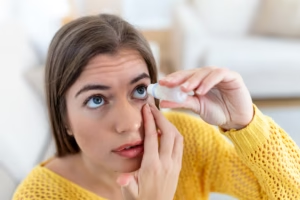Have you ever noticed tiny spots, squiggly lines or flashes of light drifting across your field of vision? If so, you are not alone. Many people experience eye floaters and flashes at some point in their lives. While they are often harmless and part of the normal aging process, sudden or persistent visual changes can sometimes signal a serious eye condition that requires medical attention.
In this detailed guide, we will explore what eye floaters and flashes are, why they occur, when to worry and what the new treatments for eye floaters are. We will also answer the most common FAQs about this condition so you can better understand when to seek help from an eye specialist.
What Are Eye Floaters and Flashes?
Eye floaters are small, shadowy shapes that drift across your vision. They often appear as
- Specks or dots
- Cobweb-like strands
- Thread-like lines
- Small clouds or blobs
These floaters are most noticeable when you look at a bright, plain background, like a white wall or a clear sky.
Floaters are caused by tiny clumps of collagen fibres inside the vitreous, the gel-like substance that fills your eyeball. As you age, the vitreous begins to liquefy and shrink, causing the fibres to clump together. These cast shadows on the retina, which you perceive as “floaters.”
Eye flashes and floaters often occur together. Flashes appear as brief flickers or streaks of light in your vision, similar to seeing “flashing lights in vision” or the effect of being photographed with a camera flash.
Flashes happen when the vitreous gel tugs or pulls on the retina, stimulating it and creating the illusion of light. While occasional flashes are common with age, frequent or new flashes may indicate a retinal tear or detachment which is a medical emergency.
Causes of Eye Floaters and Flashes
Floaters and flashes can result from a variety of conditions, ranging from benign to serious. Below are the most common causes:
- Aging and Posterior Vitreous Detachment (PVD)
As we age, the vitreous shrinks and pulls away from the retina, a process called posterior vitreous detachment. This is the most common cause of floaters and flashes.
- Eye Injury
Trauma to the eye or head can lead to sudden flashes in vision or floaters.
- Inflammation (Uveitis)
Inflammation in the back of the eye can cause debris in the vitreous, leading to visible floaters.
- Bleeding in the Eye
Bleeding (vitreous hemorrhage) can result from diabetes, high blood pressure or injury, creating sudden black spots in vision not floaters, an alarming symptom that needs immediate medical evaluation.
- Retinal Tear or Detachment
A retinal tear or detachment is one of the most serious causes of seeing flashing lights in vision. It can lead to permanent vision loss if not treated promptly.
- Migraine with Aura
Some people experience flashes or zigzag lights before a migraine headache, these are neurological, not ocular and usually temporary.
- Dry Eyes
While dry eyes do not directly cause floaters, they can make visual disturbances more noticeable. Some patients ask, “Can dry eyes cause floaters?” — the answer is not directly, but dryness can enhance the perception of existing floaters.
When to Worry About Eye Floaters and Flashes
Although most floaters are harmless, certain symptoms signal danger. You should contact an eye specialist immediately if you notice:
- A sudden increase in floaters or flashes
- Sudden black spot in vision not floaters
- Loss of peripheral (side) vision
- A shadow or curtain-like effect moving across your vision
- Persistent flashing lights in vision
- Burning or painful eyes along with vision changes
These could indicate a retinal tear or detachment, a sight-threatening condition requiring urgent medical care.
Retinal Detachment – The Real Danger Behind Sudden Flashes
A retinal detachment occurs when the retina, the thin layer at the back of the eye that senses light, separates from its normal position. It is often preceded by flashes and floaters, followed by blurred or partial vision loss.
Common causes include:
- Severe nearsightedness
- Eye trauma
- Aging (due to vitreous shrinkage)
- Prior eye surgery
If you ever wonder, “Is burning eye symptoms retinal detachment?” the burning sensation itself usually is not, but when accompanied by flashes or black spots in vision, it is a red flag to seek immediate evaluation.
Diagnosis of Eye Floaters and Flashes
An eye doctor (ophthalmologist) will conduct a comprehensive dilated eye exam to inspect the vitreous and retina. Tests may include:
- Visual acuity test – to check clarity of vision
- Slit-lamp examination – to view the front and back of the eye
- Ophthalmoscopy – to inspect the retina
- Optical coherence tomography (OCT) – for detailed imaging of retinal layers
Prompt diagnosis can prevent permanent vision damage if a retinal tear or detachment is detected early.
New Treatment for Eye Floaters
Traditionally, mild floaters do not require treatment. However, if floaters severely affect your vision, there are new treatment options available:
- Laser Vitreolysis
This non-invasive laser treatment targets and breaks up floaters into smaller particles, reducing their visibility. It is one of the most promising new treatments for eye floaters with minimal recovery time.
- Vitrectomy Surgery
A surgical option where the vitreous gel is removed and replaced with a clear solution. This procedure can eliminate floaters but carries higher risks, so it’s reserved for severe cases.
- Lifestyle Adjustments
- Stay hydrated
- Protect your eyes from UV light
- Avoid smoking
- Manage diabetes and blood pressure
- Maintain regular eye checkups
Can Eye Floaters Go Away on Their Own?
In most cases, yes. Floaters often fade or move out of your central vision over time as your brain adapts. However, new or sudden floaters, especially with flashes in vision, should never be ignored.
10 Frequently Asked Questions (FAQs)
- Are eye floaters and flashes normal?
Yes, they are common with age. But if you experience a sudden increase or flashes, it is best to see an eye doctor.
- Can dry eyes cause floaters?
Dry eyes do not directly cause floaters but they can make existing floaters more noticeable due to visual discomfort or irritation.
- What do flashes in vision look like?
They appear as brief streaks, flickers or arcs of light, often more visible in dark environments.
- When should I worry about eye floaters and flashes?
Seek immediate care if you notice sudden black spots in vision not floaters, loss of vision or a shadow effect.
- What causes flashing lights in vision?
Usually, it is due to vitreous pulling on the retina. But it can also be related to migraines or retinal tears.
- Is burning eye symptoms retinal detachment?
Not typically. Burning is more related to dryness or irritation but if it occurs with flashes or vision loss, get examined urgently.
- Are there new treatments for eye floaters?
Yes, laser vitreolysis and vitrectomy are advanced treatments that can effectively reduce floaters when necessary.
- Can stress or fatigue cause eye flashes and floaters?
Stress and lack of sleep can make you more aware of floaters, but they are not the direct cause.
- Can sudden black spot in vision not floaters mean retinal detachment?
Yes. A dark shadow or sudden black spot may signal retinal detachment, seek medical help immediately.
- How can I prevent eye floaters and flashes?
You can not completely prevent them, but maintaining good eye health through hydration, nutrition, UV protection and regular eye exams can reduce risks.
Conclusion:
Eye floaters and flashes are often harmless age-related changes, but sometimes they act as early warning signs of serious eye diseases like retinal tears or detachment. Knowing when to worry and acting quickly, can save your vision.
If you experience sudden black spots in vision not floaters, continuous flashing lights in vision or any changes in sight, consult your eye doctor immediately.
At Leevision, we are committed to protecting your eyesight with advanced diagnostic tools, expert care and the newest treatment options for eye floaters and flashes. Your eyes deserve attention do not wait for symptoms to worsen before taking action.














